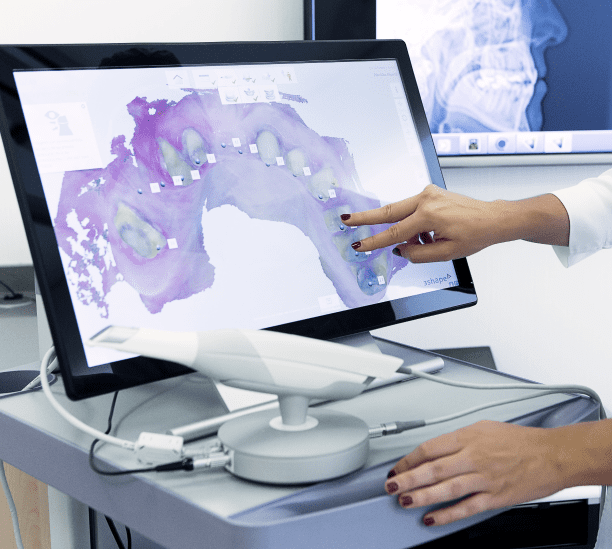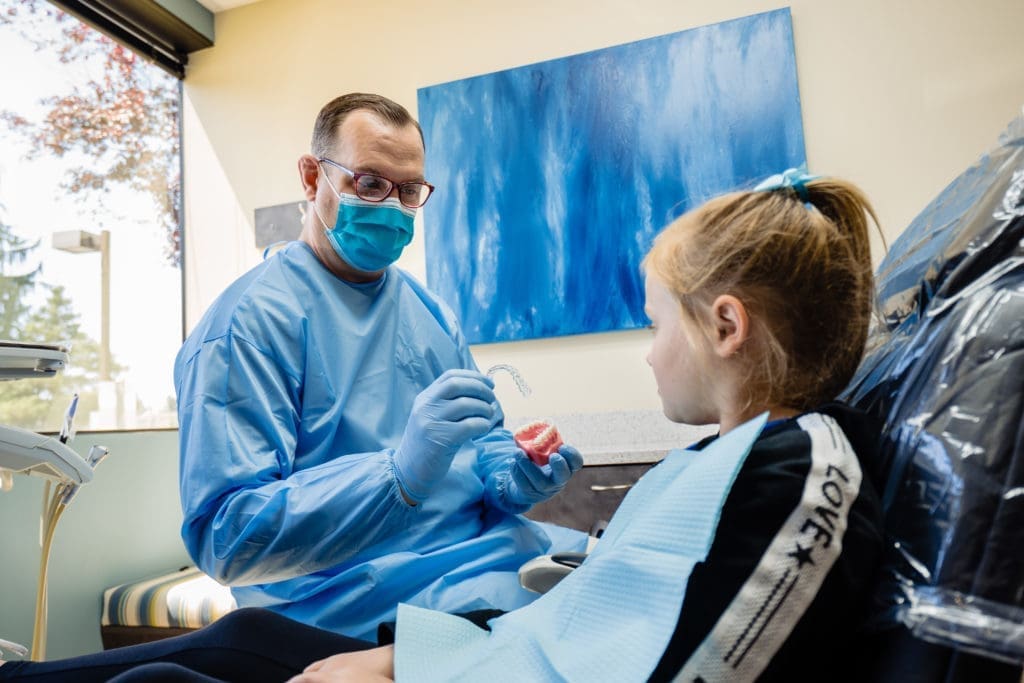
Table of Contents
What is Bruxism (Teeth Grinding)?
Bruxism, often referred to as teeth grinding, is a condition characterized by the involuntary or habitual grinding, clenching, or gnashing of teeth. This behavior can occur during the day (awake bruxism) or at night (sleep bruxism), with sleep bruxism often being a more subconscious act linked to sleep-related disorders.
While occasional teeth grinding might not cause significant harm, chronic bruxism can lead to a range of dental and oral health issues, including worn tooth enamel, increased tooth sensitivity, and jaw pain. It’s important to address bruxism not only to protect dental health but also to alleviate any associated discomfort or potential complications such as temporomandibular joint (TMJ) disorders. Understanding the triggers—such as stress, anxiety, or specific sleep issues—is crucial for effective management and treatment.
What Causes Bruxism?
Bruxism, or teeth grinding, can stem from several factors that may interact in complex ways. Here are the common triggers:
Stress and Anxiety: High levels of stress and anxiety are often linked to bruxism, especially awake bruxism. People may grind their teeth during the day as a response to stress or as a coping mechanism.
Sleep Disorders: Conditions like sleep apnea, which involves pauses in breathing during sleep, are associated with sleep bruxism. Movements related to disrupted sleep may trigger teeth grinding.
Misaligned Teeth or Abnormal Bite: When teeth are misaligned or there’s an abnormal bite, it can cause uneven pressure on the teeth, leading to grinding. Orthodontic correction may help alleviate this issue.
Side Effects of Medications: Certain psychiatric medications, particularly antidepressants, have been linked to an increased risk of bruxism. Consultation with a healthcare provider about medication side effects is recommended if bruxism develops after starting new medication.
Each of these triggers can interact with others, complicating the picture and necessitating a comprehensive approach to treatment. Understanding the underlying causes is crucial, as it allows for more targeted and effective treatment strategies to be developed, often involving behavioral adjustments, medical interventions, or dental corrections.
What Are the Common Symptoms of Bruxism?
Bruxism, or teeth grinding, manifests through several symptoms that can affect different parts of the body, primarily centered around the jaw and teeth. Recognizing these signs early is crucial for effective management and treatment.
Jaw Pain and Discomfort: Constant grinding can lead to significant jaw pain as the muscles become overworked and stressed. This discomfort can be persistent and may worsen with continued grinding.
Tooth Wear and Damage: The force exerted on teeth during grinding can cause noticeable wear and damage. This includes flattened tooth surfaces, chipped edges, and even cracks in severe cases. Over time, this damage can compromise the structural integrity of the teeth.
Headaches: Bruxism often leads to tension-type headaches, which typically manifest in the temples or around the forehead. These headaches are most common in the morning due to nighttime grinding but can also occur any time of day if stress-induced grinding is frequent.
Earaches: The intense and continuous contraction of the jaw muscles can result in sensations that mimic earaches, even though the ears are not directly affected. This pain is typically a referral from the temporomandibular joint (TMJ) due to its proximity to the ears.
Increased Tooth Sensitivity: As the enamel wears down from repeated grinding, teeth may become more sensitive to temperature changes and certain foods, resulting in discomfort or sharp pain during eating or drinking.
Tightness or Locking of the Jaw: In more advanced cases, individuals may experience tightness in their jaw muscles or difficulty in opening and closing their mouth, a condition known as trismus.
If any of these symptoms are observed, it’s important to consult with a dental professional. They can assess the severity of bruxism and suggest appropriate treatments to alleviate symptoms and prevent further dental damage.
How Do Dentists Diagnose Bruxism?
Diagnosing bruxism is a critical step that requires careful evaluation by a dentist, involving both clinical examinations and a detailed discussion of the patient’s history. Initially, the dentist will conduct a thorough examination of the patient’s teeth and jaw to identify any physical signs of bruxism, such as abnormal tooth wear, damage to dental restorations, or evidence of jaw muscle discomfort. This physical examination helps in assessing the extent of the condition.
During the visit, the dentist will also review the patient’s dental and medical history. They will ask questions about any symptoms the patient may be experiencing that could be related to bruxism, such as headaches, jaw pain, or disturbances during sleep. This conversation helps to correlate symptoms with physical findings.
The dentist might inquire about factors that can contribute to bruxism, such as stress, anxiety, specific medications, or other health issues. Understanding the patient’s lifestyle and stress levels can provide insights into potential triggers or underlying causes of bruxism.
After gathering all the necessary information, the dentist can make a well-informed diagnosis and recommend appropriate treatment options. Regular follow-ups may also be scheduled to monitor the condition and make adjustments to the treatment plan as needed.
What Are the Treatment Options for Bruxism?
Bruxism can be effectively managed through a variety of treatment options designed to reduce symptoms and prevent further dental damage. Here’s an overview of some common approaches:
- Mouthguards and Splints: Dentists often recommend wearing a mouthguard or splint at night to protect the teeth from the pressure of grinding. These devices are custom-made to fit the mouth comfortably and help distribute the force of biting more evenly.
Stress Reduction Techniques: Since stress is a major trigger for bruxism, techniques aimed at reducing stress can be beneficial. This may include counseling, exercise, meditation, or other relaxation techniques.
- Dental Correction: In cases where bruxism is caused by an abnormal bite or misaligned teeth, corrective dental treatments such as braces or other orthodontic treatments may be needed to address the underlying issue.
- Medication: In some cases, medications may be used to help manage bruxism, particularly if it’s related to anxiety or sleep disorders. These might include muscle relaxants or specific medications to help improve sleep.
Each treatment plan is tailored to the individual’s specific needs, and a combination of treatments may be employed to achieve the best results. Regular follow-ups with the dentist are important to assess the effectiveness of the treatment and make adjustments as needed.
How Does Bruxism Impact Dental Health?
Unchecked bruxism can have serious consequences on one’s dental health, leading to a range of issues if not managed properly:
Tooth Wear and Damage:
- Constant grinding can significantly wear down the enamel, the protective outer layer of teeth, making them more susceptible to decay.
- Over time, the excessive force can lead to tooth fracturing, chipping, or even tooth loss as the structural integrity of the teeth is compromised.
Jaw Problems:
- The persistent stress on the jaw muscles and joints can lead to temporomandibular joint disorders (TMJ or TMD). This condition can cause pain in the jaw joint, difficulties in moving the jaw, and an audible clicking sound when opening or closing the mouth.

How Does Bruxism Affect Children and What Are the Special Considerations for Their Treatment?
Bruxism in children can sometimes differ from adults both in causes and implications:
Causes in Children:
- For many children, bruxism might be a response to the pain of teething or earaches.
- It can also be a way for children to explore their growing teeth and jaws.
Impact on Dental Development:
- Although children’s teeth and jaws change rapidly as they grow, persistent grinding may damage the permanent teeth as they come in or affect the development of jaw and facial muscles.
Treatment and monitoring strategies for young patients
- Regular Dental Check-ups: Monitoring the child’s dental health is crucial to catch signs of bruxism early.
- Preventive Measures: Using mouth guards can protect children’s teeth from the effects of grinding during sleep.
- Behavioral and Psychological Interventions: If stress is identified as a cause, techniques such as relaxation exercises or counseling might be recommended.
- Parental Guidance and Supervision: Parents play a crucial role in observing their child’s behavior and ensuring they follow through with treatment.
Given the potential impact on their developing mouths, it is important to address signs of bruxism in children promptly. Treatment plans should be tailored to the individual child, considering both the physical and emotional aspects of the condition.
Ready to Explore Your Options?
If you’re considering bruxism dental solutions, Thomas Dentistry is here to guide you. Our team is dedicated to helping you achieve the smile you’ve always wanted, with a range of options tailored to your needs. We believe in providing personalized care that goes beyond just your teeth, focusing on your comfort and satisfaction.
Contact Thomas Dentistry to learn more about our dental services and how we can help you on your journey to a brighter, more confident smile. Schedule a consultation with us, and let’s explore the possibilities together.
